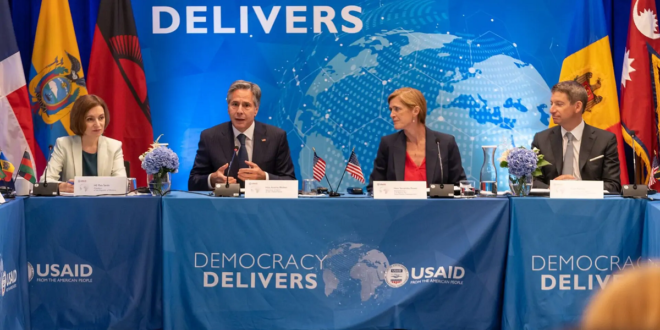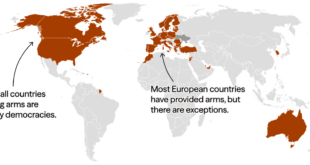Russia’s invasion of Ukraine is a blatant violation of international law and strikes at the core principles of the UN. This has been widely accepted by political elites and the public at large in the United States and across Europe. In the West, there is a sense of triumphalism and certainty in the righteousness of the cause, which is seen as a clear-cut case of good vs. evil in the spirit of World War II. However, the reaction in the rest of the world has been very different. The war has unified the West but divided the West from the rest of the world. The majority of the countries in the Global South see the Ukraine war as a problem in that, for example, it has caused energy and food prices to rise, but they are not blaming Russia for starting the war and have declined to join Western sanctions. This recalls the Cold War, during which most of the developing world adopted a non-aligned stance, preferring to stay out of the contest between the superpowers.
The stance of China, Russia’s “no limits” partner, was predictable; but it is sobering to see democracies like Brazil, India, Indonesia, and South Africa adopting this position. This phenomenon has not attracted much discussion in the West because it casts a shadow over the dominant Just War narrative and raises uncomfortable questions about America’s role in the world. The neutral stance of the Global South is partly due to pragmatic economic considerations but also stems from the persistence of the ideological legacy of anti-Americanism from the Cold War and a wariness about U.S. influence rooted in U.S. actions since 1991. This neutral stance can be seen both at the elite level (as reflected in votes at the UN) and in public opinion.
Applying the Battering Ram
Russia’s brutal deployment of “hard power” against Ukraine has shattered its efforts to boost itself globally as a “soft power.” However, Russia has benefited from the lingering legacy of Soviet “soft power” in the developing world, with its narrative of anti-colonialism and anti-Americanism. Over time that argument is fading in appeal as the information about Russia’s atrocities spreads and as Russia’s military setbacks mount.
Russia has invested heavily in a media presence in the Global South, attracting a substantial audience for its RT television channels (RT Spanish has more followers than CNN Spanish). Nonetheless, the torrent of images from the war, including drone footage and Ukrainian use of social media, has given Kyiv powerful tools in its local and global information war against Moscow. Ukraine’s David vs. Goliath narrative is symbolized by the remarkable transformation of Volodymyr Zelensky into an iconic wartime leader, a combination of Winston Churchill and Che Guevara.
Diplomatic Responses
On March 2, in a UN General Assembly vote, 141 countries “deplored the aggression” of Russia against Ukraine, while 5 voted against and 35 abstained. At first glance, the vote looks impressive in its condemnation of Russia—until one considers that the 40 countries that abstained or voted no included India, China, and South Africa, and account for 60 percent of the world’s population. Brazil was the only BRICS country that voted for the resolution.
In April, 93 countries voted for Russia’s suspension from the UN Human Rights Council: 58 abstained, and 24 voted against. Russia had warned countries that a “Yes vote or abstention would be viewed as an unfriendly gesture with consequences for bilateral ties.” Russia was effectively telling the countries of the Global South, “you are next” if you let the West push Russia out of Ukraine. President Vladimir Putin told the St. Petersburg Economic Forum on June 16 that “After declaring victory in the Cold War, the United States proclaimed itself to be God’s messenger on Earth.” On July 7, Putin said, “this operation means the beginning of a radical breakdown of the U.S.-style world order. This is the beginning of the transition from liberal-globalist American egocentrism to a truly multipolar world.”
However, when leaders of the Shanghai Cooperation Organization met in Samarkand on September 15-16, Putin had to publicly acknowledge China’s “questions and concerns” about the war in Ukraine. The Chinese readout of the Samarkand meeting made no reference to Ukraine—there was no direct criticism of Russia but no statement of support either. Indian Prime Minister Narendra Modi told Putin, “today’s era is not of war.” Later that week, the UN General Assembly voted 101 to 7 with 19 abstentions to allow Zelensky to give a virtual address to the assembly—a departure from usual practice. On October 12 the UN General Assembly voted to condemn Russia’s annexation of four Ukrainian provinces by 143 to 5, with 35 abstentions. So despite the duration and intensity of the war, the high-population countries of the Global South maintained their neutral stance.
Public Reactions in the Global South
Global opinion toward the Ukraine war is complex and ambivalent. An Open Society Foundations survey of 22 countries in September found that Ukraine was quite low on the list of priorities. The proportion of respondents listing it as a top three issue is, for instance, 50 percent in Japan, 33 percent in Germany, 22 percent in the United States, and 21 percent in Nigeria and India. In non-OECD countries, 44 percent of respondents agreed with the statement: “Russia is justified in wanting to have greater influence over its neighbor Ukraine than the West has,” as opposed to 30 percent in OECD members. However, at the same time, there was an undercurrent of sympathy for Ukraine. Sixty-six percent agreed that Russia is “a former empire trying to subjugate a former colony,” and 49 percent agreed that Russia is committing war crimes. The report concluded, “Even in countries where respondents are broadly more sympathetic to Russian messaging, there was a majority in favor of Russian withdrawal.”
A May poll of 52 countries by the Alliance for Democracies found a net positive view of Russia in only 11 countries, including China (49 percent), India (36), Vietnam (33), and Pakistan (31).[1] In the Arab world, where RT has been broadcasting in Arabic since 2007, a YouGov survey of 14 countries found that 66 percent of respondents had no stance on the war. Eighteen percent backed Ukraine and 16 percent Russia, while 24 percent blamed NATO and only 16 percent Russia for the start of the war.
The welcome given to Ukrainian refugees in Poland and elsewhere is contrasted with the treatment of migrants from the Global South, a difference attributed to the fact that the Ukrainians are white and Christian. The gender dimension should also be remembered: Ukrainian refugees are 80 percent women and children, whereas single young men predominate among migrants crossing the Mediterranean. Egypt voted against Russia at the General Assembly in March, but after President Joe Biden suspended military aid over human rights violations, President Abdel Fattah Sisi attended the St. Petersburg Economic Forum in June. Israel did not sanction Russia and refuses to sell weapons to Ukraine, preferring to cooperate with Russia in handling the conflict in Syria and restraining the threat from Iran.
A similar indifference seems to prevail in Africa. Ugandan journalist Khatondi Wepukhulu argues that many Africans still recall the former Soviet Union as a reliable ally in the fight against the remnants of Western colonialism, such as the Portuguese empire or apartheid South Africa. Only 10 of the 54 African countries were among those who voted to suspend Russia from the UN Human Rights Council. On the other hand, 29 of them did vote to condemn Russia in the March UNGA resolution.
Even in Latin America, governments are mostly siding with Russia—with both candidates for the presidency in Brazil, the leftist Lula de Silva and the incumbent rightist Jair Bolsonaro, taking a neutral stance. The Bahamas is the only country in the Organization of American States that has joined the sanctions.
Turkey is dependent on energy imports from Russia, keen to expand economic ties, and cooperates in managing the Syrian civil war. On the other hand, it does not want to see Russia dominate the Black Sea littoral. It has refused to sell Bayraktar drones to Russia and has donated some to Ukraine.
The mainstream Indian view is to regard Ukraine as “a pawn in the power game.” Indian elites seem united behind the idea that Moscow is an “all-weather friend,” going back to its UN veto over Kashmir in 1957. Practical factors also come into play: India buys 80 percent of its weapons from Russia and has ramped up its purchases of cut-price Russian oil since the outbreak of the war. India’s foreign policy elite was also alarmed by the U.S. withdrawal from Afghanistan.
There was, however, a strong positive response from NATO’s core allies around the world. Japan, Singapore, South Korea, and Taiwan joined the sanctions on Russia—with the latter two being critically important given that together they manufacture over 90 percent of the world’s high-end semiconductors. Australia, Japan, New Zealand, and South Korea (the Asia-Pacific Four) attended the NATO Madrid summit in June 2022 for the first time.
A Closer Look at Chinese Reactions
The response of China is crucially important given its ability to provide an economic, diplomatic, and possibly military lifeline to Russia. At their meeting in Beijing on February 4, Putin and Xi issued a joint statement affirming their “no limits” partnership and reiterating their commitment to “indivisible security.” The statement criticized NATO by name for the first time. But there was little substance beneath the anti-Western diatribe. There is no evidence that China was forewarned of the invasion: they did not start evacuating their 6,000 citizens in Ukraine until February 28.
In general, the Chinese media have replicated the Russian narrative, blaming the United States for provoking the war by expanding NATO and arming Ukraine. But Xi has tried to maintain a tricky balancing act—staying neutral while trying to build the PRC’s role as a leader in the global system. Chinese-Australian analyst Bobo Lo convincingly argues that the Russia-China partnership is based on interests, not values. As a rising power, China is revisionist but not revolutionary, increasingly confident in its power and authority. In contrast, Russia is a declining power.
Initially, some argued that Beijing would be the big winner of the Ukrainian war—the only winner, in fact. The war would force the United States to pivot back to Europe and scale back its plans to contain China, and at the same time, it would weaken Russia and make it desperately dependent on its trade with China. At the Eastern Economic Forum in Vladivostok in early September, Putin admitted, “our Chinese friends are tough bargainers. Naturally, they proceed from their national interests in any deal, which is the only way to go.”
Increasingly, China is trying to expand its global role from economic development to security issues, taking the Ukraine war as evidence of the failure of the U.S.-led post-Cold War security system. In April, Xi launched a Global Security Initiative to counter U.S. hegemonism. It is not so much that China is pro-Russian but that it is anti-Western. Ukraine fits the Chinese master narrative of an overbearing United States interfering in regions that are none of its business. The Chinese government’s stance seems to resonate with the public. In a Carter Center survey of 5,000 Chinese internet users between March 28 and April 5, 75 percent agreed it was in China’s national interests to support Russia.
However, dig a little deeper, and one finds cracks in the Chinese government’s position. There is a lack of reciprocity in the relationship: while Russia accepts the Beijing line on Taiwan and Tibet, China does not accept Russia’s position on Abkhazia, South Ossetia, and Crimea. It has been neutral in key votes in the UN rather than voting with Russia against the majority. Most Chinese companies have tried to avoid violating Western sanctions.
China, like the rest of the Global South, has suffered from the spike in energy and food prices caused by the war. The Chinese economy was already reeling from a real estate debt crisis and regional covid lockdowns. Moreover, the poor military performance of China’s ally—and the fact that China’s arsenal is modeled on Soviet/Russian weaponry—raises questions about the combat effectiveness of China’s military, which has not fought a war since 1979 (against Vietnam, which it lost).
There were some signs of disagreement amongst China’s foreign policy establishment. In March Hu Wei, vice chairman of the Public Policy Research Center, called on Beijing to distance itself from Russia. Gao Yusheng, who served as China’s ambassador to Ukraine from 2005 to 2007, said, “The so-called revitalization of Russia under Putin’s reign is based on a false premise… Russia’s decline is evident in all areas.” The article was taken down within hours of being posted. “Russia’s war with Ukraine, no matter how reasonable in responding to NATO’s expansion, cannot be said to be legitimate,” said Zhou Bo, a retired PLA colonel, on May 9 at an event in Delhi.
Conclusions & Recommendations
The policy implications of this analysis are disturbing. The Global South’s tolerance for Russia’s invasion of Ukraine has worrying implications for the rules-based international order, and suggests that those countries may be willing to break the Western sanctions and step up their trade with Russia. Western leaders have focused on framing the war using language that consolidates support for the war amongst domestic constituencies at home and amongst members of the NATO alliance. That means describing the war as a battle between democracy and autocracy, as a justification for NATO enlargement, and as a tool to contain Russia—or even break up the Russian Federation completely. Those arguments work well in the West but fall flat in the rest of the world. Ironically, they reinforce the Kremlin’s own narrative—that the war is about NATO expansion and the West’s desire to destroy Russia.
Part of the problem is that Washington is something of an echo chamber. Any questioning of the mainstream narrative is treated as a capitulation to Russia. Take, for example, the poll of experts that Foreign Affairs ran in April 2022. On the question, “Was NATO enlargement a mistake?”, 39 experts disagreed, 19 agreed, and three were neutral. What was surprising was the degree of confidence that the experts expressed. The average confidence on a scale of 1-10 was 8.5. Given the complexity of the situation and the number of variables affecting the outcome, that level of confidence is hubristic in the extreme. The question did not even distinguish between NATO enlargement to Central Europe versus NATO enlargement to Ukraine and Georgia: a crucial distinction.
NATO enlargement is a narrative that plays badly in the Global South, where it is seen as a cover for U.S. influence. Similarly, Kelly Grieco and Mitchiko Tsuruoka argue that the focus should not be on democracy vs. autocracy since most countries in the world are not democracies. Tommy Koh, a Singapore lawyer and diplomat, argues that the war should be framed not as a struggle between democracy and autocracy, nor between Russia and the West, but as a violation of international law, no more and no less. A Western narrative that focused on Russia’s violation of Ukraine’s sovereignty, Russia as a vengeful ex-colonial power, and Russian war crimes, would play better in the Global South than a narrative of democracy and NATO enlargement.
One problem is that few American policy experts are willing to stress the sovereignty argument, given the U.S. record of launching wars that violated the sovereignty of Yugoslavia, Afghanistan, and Iraq. The bombing of Yugoslavia was justified by the incipient genocide in Kosovo—giving Russia the opportunity to use the same legal rationale to try to justify its intervention in Crimea and Donbas. The toppling of the Taliban was a response to the 9/11 attacks (and was unanimously endorsed by the UNSC). But the invasion of Iraq in 2003 is harder to justify. In order to more forcefully use the sovereignty argument against Russia, the U.S. policy establishment would have to more frankly admit that the invasion of Iraq was a tragic mistake.
 Eurasia Press & News
Eurasia Press & News


